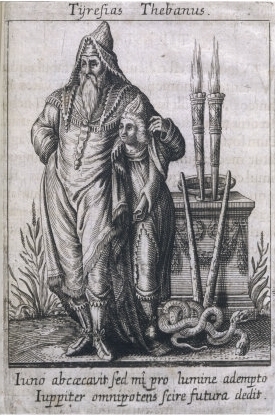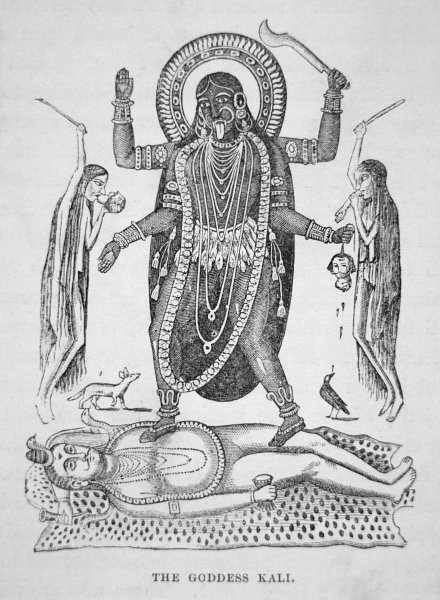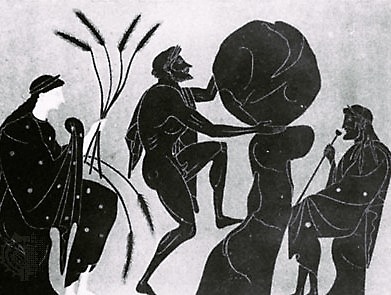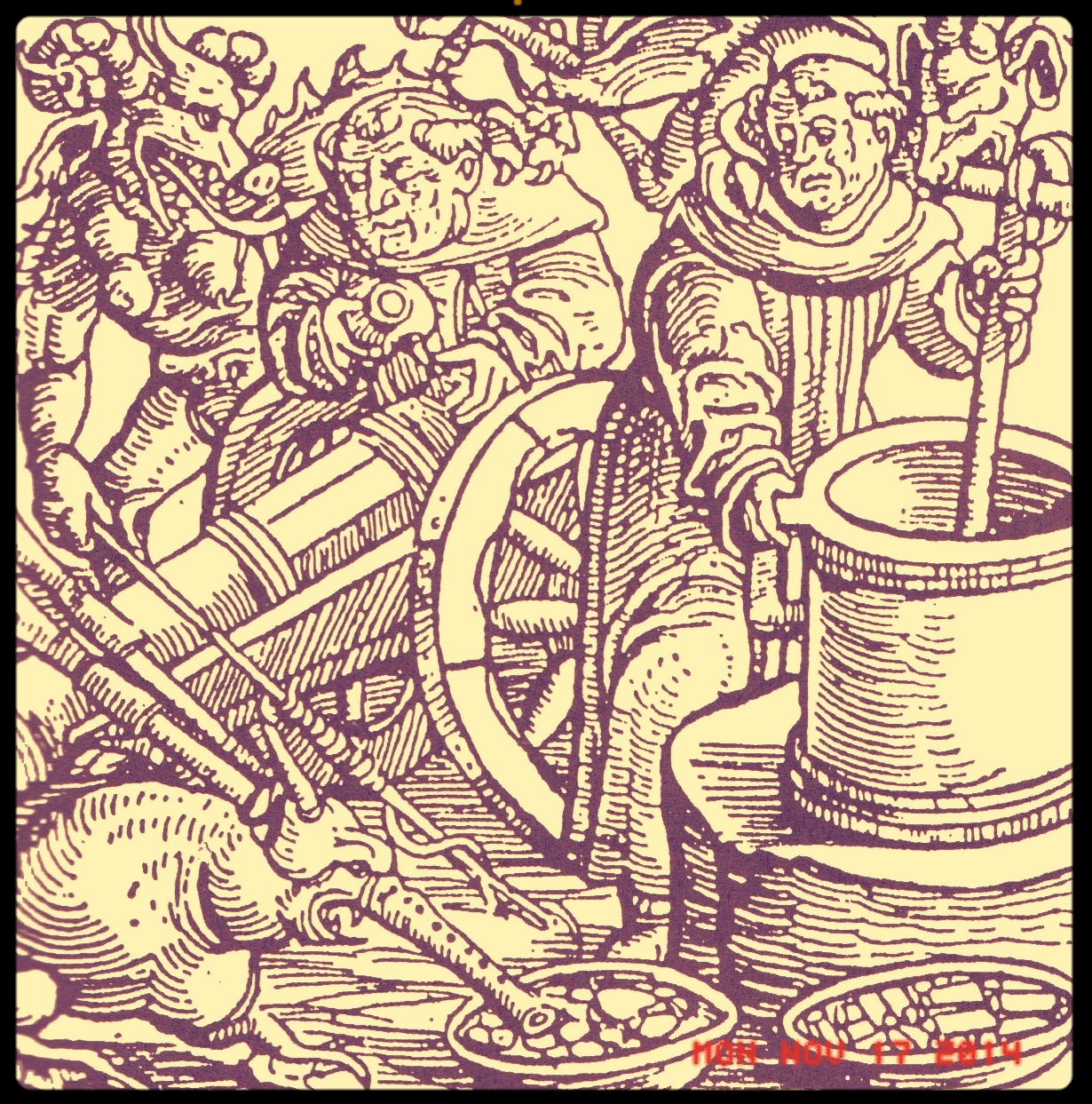—Hall of Haunts III: ALCHEMY!—
An seasonal piece of theatre made for the rooms of Rutherfurd Hall
Created by: Morgan FitzPatrick Andrews (Tiresias the Reader, concept, script, lighting and set design), Sebastian Cummings (Labraid the Clocksmith), Dana Haberern (Persephone Proserpina, props), Liz Hollon (Persephone Proserpina), Rebecca Kanach (costumes, hallway denizen), Calia Marshall (hallway denizen), Lee Minora (Persephone Proserpina, songwriting), Jonathan Pfeffer (sound design, hallway denizen), Mason Rosenthal (Voice of Vincent the Rabbit, direction), Dani Solomon (Kalika the Inquisitor, production manager), Elizabeth Weinstein (Persephone Proserpina), and Vincent R. Abbot as himself.
Additional props by Chenda Cope. Production support from Laurie Rapasardi.
"Rustic Science can turn cream into butter; Biblical Science, water into wine; Modern Science shall make it possible to transform coal into diamonds, but not yet lead into gold—that is the work of Alchemy."
In his book, From Alchemy to Chemistry, author John Read describes the former (alchemy) as possessing strands of the latter (chemistry), “interwoven with threads from ancient and later religions, folklore, mythology, astrology, magic, mysticism, philosophy, theosophy, and other wide fields of human imagination and experience.” Alchemy emerged as an interdisciplinary art through the cultural and technological exchange in the Eastern Mediterranean around the 6th century BCE, and then spread across the hemisphere where it persisted until the Scientific Revolution of the late 17th century. What we’re left with is an arcane pseudoscientific practice at the nexus of many cultures, and ideas which, by today’s standards, are mostly wrong. But in their era the great alchemists, like today’s doctors and scientists, were the authority on the workings of the universe and all it contained.
Dana Haberern as Persephone Proserpina
To condense alchemy’s diverse history into less than 60 minutes was the Medium Theatre Company's assignment in October 2014. We transformed Rutherfurd Hall into the Allamuchy Alchemy Academy, home to the world’s few final alchemists and their noble attempts to grasp at the threads of their pseudoscience. Our protagonist guide invited the audience along to visit the Academy's other residents from whom she'd acquire the ingredients needed for her experiment. These ordinary objects shared their names with human body parts, like the recipe for the ironic automaton in the novelty jazz standard, “The Dummy Song”:
I'll take the legs from some old table,
I'll take the arms from some old chair,
I'll take the neck from some old bottle,
And from a horse I'll take the hair,
I'll take the hands and face from off a clock,
And baby, when I'm through,
I'll get more loving from that dum, dum, dummy
Than I ever got from you!
We assembled similar objects in our story, but with a bit more eerie Halloween flavor, topped off with one gruesome final item: the very alchemist leading the quest must sacrifice her own life in order to revive her sister, as prescribed by the First Law of Alchemy:
“In order to attain something, one must give something up.”




Our play’s other alchemists, also abiding by this First Law, had each already given something up, and that thing was the clue for what the audience was looking for—a pair of eyes (the letter “I” twice), two hands encircling a face (off a clock), a tongue (from a shoe), and ears (corn)—all highlighted by characters whose visage was defined by the conspicuous absence (or overabundance) of these attributes. A key detail was that for the alchemists who had no eyes or hands or tongues, the deficit of these organs was by no means a disability, but rather a different way of relating to the world and even the key to accessing greater power. We named these characters after legendary figures whose own disabilities also granted them greater abilities. Our Reader in his library was named for Tiresias, that blind prophet of Thebes who foretells the latter half of The Odyssey when Odysseus and crew pay him a visit in the Underworld. Our Clocksmith, Labraid, took his name from a mythical Irish king who won his realm in a boat race by becoming the first to touch land when he severed his own hand and threw it upon the shore. Kalika, the Inquisitor, was named for the Bengali goddess Kali, whose only way to deal with her constant rampage of death and destruction was to go about with her tongue lolling out. Our Kali, by contrast, kept hers hidden in a gesture of tempered fury that commanded the crowd’s attention and obedience. It's also important to note that some of the actors playing these characters live with real dis/abilities of their own, and performing dis/ability onstage can be a transformative act of mediumship.
Then there was our guide (played by four different actors so that we could run multiple performances simultaneously by starting tours every 20 minutes), whose quest was to collect the objects and then sacrifice her life to resurrect her sister…who then re-collects the same objects and sacrifices her life to resurrect her sister. This endless cycle recalls the myth of Sisyphus, eternally trundling his boulder up a hill in Erebus only to have it roll down again, or Tantalus forever stretching up to eat unreachable grapes and stooping down to drink unattainable water. The Queen of that Underworld was herself trapped in a cycle mandated by Zeus: stuck in Erebus with her possessive husband for one third of the year, then escaping her hellish curfew to bring springtime back to earth, only to return again when winter came. And so our guides were named for this fertility/death goddess in her Greek and Roman incarnations: Persephone Proserpina.
Alchemy is, at its essence, a Sisyphean task. Depictions of medieval alchemists are often ones of futile struggles to beget gold and silver from lead and tin. Our alchemists too were like those condemned by ceaseless and futile toil, especially our Tiresius as an eyeless researcher whose effort is to determine the Laws of the Universe by reading every single page ever printed, and our handless Labraid, whose project is to remove the hands from all the world’s clocks in his desire to stop Time. Even more Sisyphean was the fact that these characters repeated their encounters with Persephone and her entourage every 20 minutes in a closed time loop far more confining than the one found in the 1993 film Groundhog Day
Sebastian Cummings as Labraid the Clocksmith and Dana Haberern as Persephone Proserpina
No matter how damned or damning her task, the audience always stood by their Persephone, a loyalty fueled by many factors: she was the host and explainer of the rules of the game, a lovely woman (or women) with an equally lovely name. She bore no disfigurement (unless one thought maybe that she and her sister were one person, in which case half of her was missing), nor any off-putting tics (unless one decided that she was delusional about even having a sister). She was the protagonist and friend, and thereby anyone who crossed her was an antagonist and enemy. And so everyone stood and sang the Allamuchy Alchemy Academy Anthem, and no one held any qualms when Persephone said she wanted to raise her sister from the dead, though everyone knew that this was probably a very bad idea. When she made a deal with Vincent, a demonic woman-eating Rabbit to swap a lump of human flesh for the ears of decorative corn in his cage, someone always came forward, stuck her hand in that jar of bloody gristle and made the exchange. And when Persephone entered Labraid’s chamber uninvited and asked for help in her completely self-serving project, she never failed to persuade everyone to abandon their ethics and conspire to steal a clock from him while he lay on the ground helpless and crying. For one performance, an audience member even kicked him and called him a misogynist. We are all actors, after all, especially on Halloween.
As Mediums, our theatre is a concoction of truth and fiction, actors and audience, and it's up to all of us to determine the outcome of our quest. The ancient alchemies of Aristotle and Jabir ibn Hayyan led us astray with erroneous information for two millennia, yet their core ideas—that everything shares a common soul balanced out by complementary forces—were later supported by the discovery of the atom and its composite parts. But even that idea shall surely one day shudder under the discoveries of a future science that will render today's periodic tables obsolete. Whether it's Halloween or not, are we playing the part of alchemists, thinking that we know everything about the universe? An audience willing to take the side of the first character to come along and tell us a compelling story? Do we follow that story, even when it conflicts with our ethics or basic logic? And what do we do when faced with a different truth, one supported on sturdier evidence? Indeed, in order to attain something, one must give something up—that is the First Law of Alchemy.
Selected References
- Adichie, Chimamanda Ngozi. "The Danger of a Single Story." TED Talks. TED, July 2009. Web. 12 Nov. 2014.
- Aristotle. Poetics. Cambridge,: Harvard University Press, 1995. Print.
- Berger, John. Ways of Seeing. BBC. 1972. Television.
- Bishop, Claire. Participation. London: Whitechapel, 2006. Print.
- Brooks, Douglas Renfrew. Poised for Grace: Annotations on the Bhagavad Gita from a Tantric View. The Woodlands, TX: Anusara, 2008. Print.
- Dear White People. Dir. Justin Simien. Perf. Tyler James Williams, Tessa Thompson, Kyle Gallner. Lionsgate, 2014. Film.
- Duncan, Kath. "Wannabes." Re:sound #69: The Body Image Show. Third Coast International Audio Festival. WBEZ, Chicago, IL, 2007. Radio.
- Fixed: The Science/Fiction of Human Enhancement. Dir. Regan Brashear. Perf. Patricia Berne, Fernanda Castelo, Hugh Herr. New Day Films, 2014
- Groundhog Day. Dir. Harold Ramis. By Danny Rubin. Perf. Harold Ramis, Bill Murray, and Andie MacDowell. Columbia Pictures, 1993. Film.
- Hamilton, Edith. Mythology. New York: Back Bay, 1996. Print.
- Homer. The Odyssey. Trans. Robert Fagles. New York: Viking, 1996. Print.
- Kinsley, David R. The Divine Player: A Study of Kṛṣṇa Līlā. Delhi: Motilal Banarsidass, 1979. Print.
- Nicolas, J. L. "Red Hand Counties." World in Words Magazine. 20 Jan. 2013. Web. 20 Nov. 2014.
- Read, John. From Alchemy to Chemistry. New York: Dover Publications, 1995. Print.
- Rose, Billy, Lew Brown, and Ray Henderson. "Dummy Song". Hoosier Hot Shots, 1944. Louis Armstrong, 1953. Decca Records. Vinyl recordings.
- Sagan, Carl. "Astronomy and Astrology." Cosmos: A Personal Voyage. PBS. 1980. Television.
- Salzberg, Hugh W. From Caveman to Chemist: Circumstances and Achievements. Washington, DC: American Chemical Society, 1991. Print.





